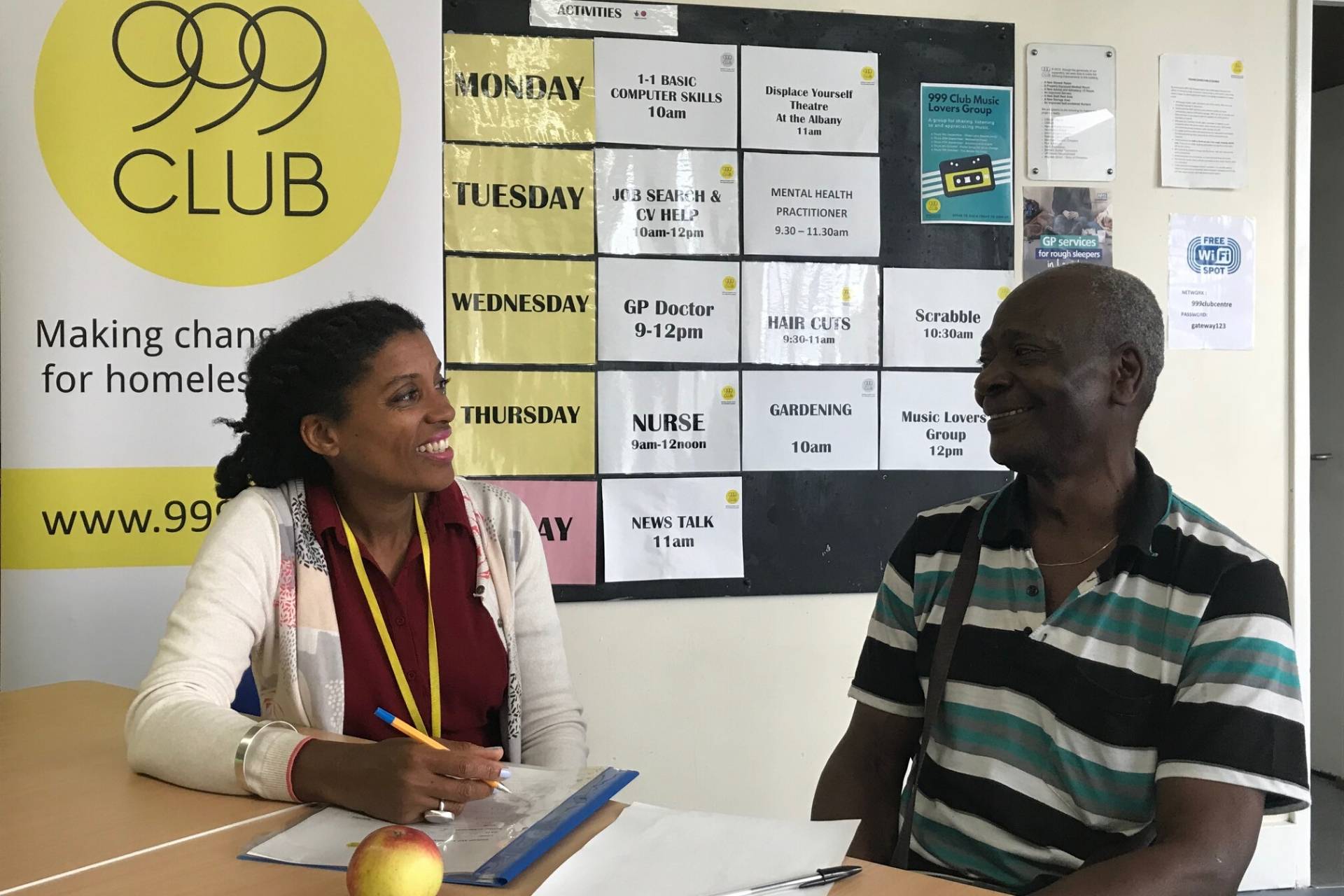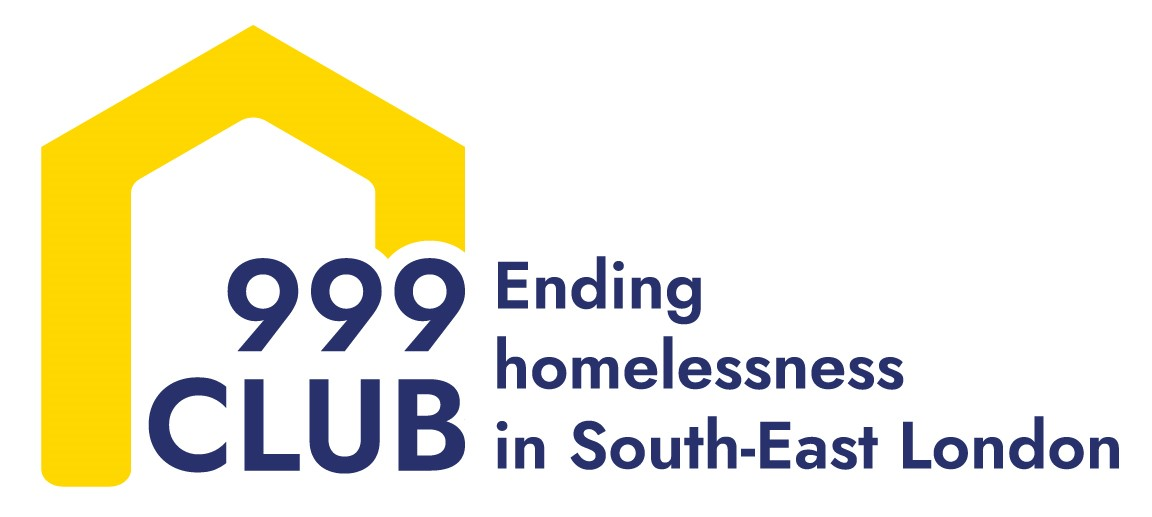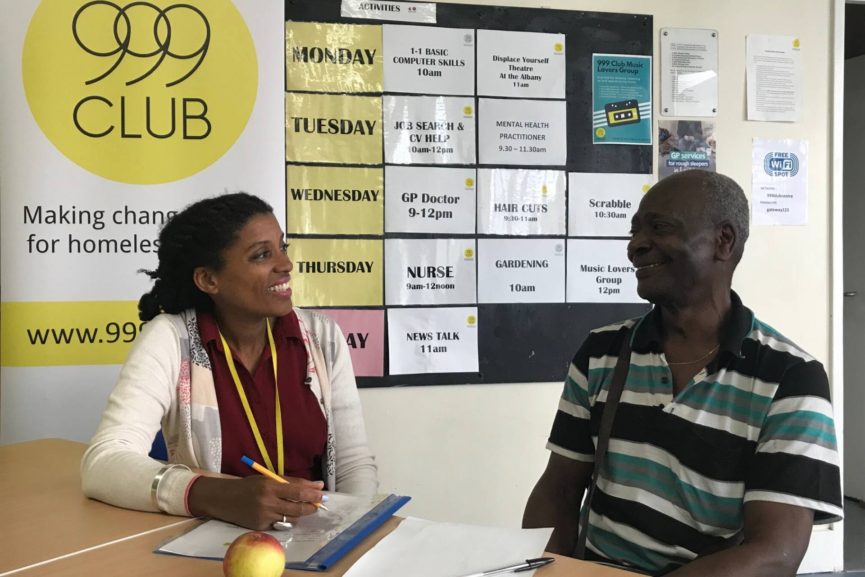
Zisca Burton (pictured left in photo before the COVID-19 crisis) is the Homelessness Prevention and Rehousing Worker at The 999 Club and is working tirelessly for the wellbeing of the guests that rely on its services throughout the COVID-19 crisis.
I spoke with Zisca to find out how the guests have been affected, how The 999 Club is continuing to operate, and what the pandemic could mean for the problem of homelessness at large.
What has the situation been like with the guests since COVID-19? Could you tell me a little bit about what you do and what’s happened in the last few months?
I work in the day centre at The 999 Club and help manage the volunteers. In the past few months we’ve moved all the guests that use The 999 Club’s night shelter services into hotels, temporary accommodation, or emergency accommodation. This was done within the space of a couple of days and was a public health initiative to stop the spread of COVID-19.
For the guests that were moved into hotels, they are provided with lunch, breakfast, toiletries, and their needs taken care of. Other guests, who were just about to be housed before the pandemic, are now housed in temporary accommodation through the council and that’s more like a room in a shared house with their normal housing option.
Some of these guests didn’t have the basics (like toiletries and pots and pans and things like that) so we helped to buy them these things and get them settled into their new room. And, for the guests in hotels, although that sounds really nice, it was nerve wracking for them too because they were just being sent to various parts of London that they weren’t familiar with (such as North Acton and Wandsworth), so they were nervous about what was happening.
Did the guests have a choice about where they were sent to?
Unfortunately not. The guests were put into different categories (low risk, medium risk, and high risk), which factored in things like whether they had any underlying health issues, mental health issues, violence in their past, and things like that, and were then sent to accommodations on the basis of their risk category. Everyone was initially screened for COVID-19, so if they had a temperature or had any symptoms then they were put in the high-risk category and put in a designated hotel where they were cared for there.
If they didn’t have any symptoms of the virus then they were just put in a normal hotel or other temporary housing. If the guests had any other factors that would deem them as high risk, they were put in hotels where they would receive more support for their needs. Full-time workers from the St Mungo’s charity have also been helping these guests.
“The pandemic has closed down libraries, cafés, public toilets, and other places that used to be vitally important for people who are homeless.”
Were the guests screened as soon as the lockdown was announced?
The guests were screened over a couple of days into the pandemic as people in the night shelter were considered very high risk—they were sleeping next to each other (at a 1 metre distance) on a mattress on the floor or in The 999 Club’s night shelter pods. We were also screening other rough sleepers in the area who we knew were still out there but were hard to locate.
We were then assigned a few people to take care of, so I was assigned a few people in hotels and temporary housing, and then also we had people who were recently housed into private rental and then, after lockdown was announced, some of them were told by the government that they were shielders (people who aren’t allowed to go outside because they are considered especially vulnerable). These people became very isolated, just locked up in their room by themselves for 12 weeks.
Our job is to phone them up and see how they are doing, asking after their physical and mental health, their money benefits, whether they have enough food, PPE, and any other problems they have. We make these calls daily or weekly, depending on the risk status of the guest.
What additional problems has the pandemic created for The 999 Club and those who rely on its services?
The government initiative was to get everyone off the streets and into a hotel or some kind of accommodation. Unfortunately, that hasn’t happened for everyone—you still find people who are on the street, some who may even have symptoms. Another problem is that, because everything is shut down, there is nowhere for people to go. Usually people who are homeless go into a library and can sit there all day in the warmth, wash, use the toilet, take care of their general hygiene needs and things like that. The pandemic has closed down libraries, cafés, public toilets, and other places that used to be vitally important for people who are homeless.
If people are rough sleeping, they don’t have access to services to meet even their basic needs. For the people who were housed or put in hotels there is also the issue of isolation, which is exacerbating people’s mental health conditions. For example, people who experience any kind of paranoia, OCD, fear of contamination of germs or anything like that, the pandemic makes these conditions even worse. We are literally being told “don’t touch any surfaces, wash your hands 20 times a day”, which can worsen all of these mental health conditions.
“Some people became very isolated, just locked up in their room by themselves for 12 weeks.”
Do the guests have contact with volunteers in the hotels?
The contact we have with the guests is mostly virtual. However, they are seeing a doctor weekly and getting their temperature taken. Although this contact isn’t personal, it’s at least some kind of interaction. The volunteers from St Mungo’s also keep in contact via phone. We also have some night shelter staff from The 999 Club going to the hotels and meeting people at a distance, bringing them masks, and a £20 supermarket food voucher. For people who have been recently moved into their own private rental, we’ve given them a starter pack with a toaster, a kettle, and other essentials to get them started.
What is The 999 Club’s funding situation like during this crisis?
In our weekly zoom meetings with other staff members we’ve been getting some really positive feedback that we’re getting grants and funding from people who are really supportive and want us to keep going during the crisis. This is how we’ve been able to buy the £20 supermarket food vouchers for people and post them or hand them over in person at a physical distance. We also top up these vouchers weekly. At the moment we have given out 60 supermarket food vouchers, each topped up with £20. People have also still been visiting The 999 Club so when I go in on occasion I’ll see people, put my mask on, and give them anything they need.
Is the kitchen still running in The 999 Club?
No, The 999 Club is only open for giving out essentials that we already have in the shelter and the donations that people have given during the crisis (such as tinned goods, cereals, and toiletries). We are working with Public Health England to find a solution in how we can safely open the day centre.
Have you had any additional support from the government throughout the crisis?
We’ve been working directly with Lewisham council to put people in the hotels and also to get them into their permanent housing (which is usually just a room in a shared house). For example, we had a couple who were rough sleeping who came to the centre (after I’ve been trying for a long time to get them picked up by London Street Rescue) and our previous CEO Tim Fallon got in contact with Lewisham council and that day the council worked with us and they were put in a hotel that evening. So they did all the paperwork and everything—so that was really good.
“The guests are really happy to hear from us when we call. Some people are very scared.”
What are the conversations like with guests at the moment?
The guests are really happy to hear from us when we call. Some people are very scared. Some people are staying in their room and not going out at all, even after the government announced that we can go out once a day. A lot of people are hearing the news and not really understanding what’s going on—I had one older man who just stayed in because he was scared to go out because of the virus. I suggested that he go out once a day, go early in the morning, go for a walk. So we’re calling people to make sure that their moods are still up, that they’re understanding the regulations and not fixating too much on the negative news. Another thing I want to say is that the guests are also concerned about our (the staff and volunteers’) wellbeing and are always asking how we are.
What do you see happening to the problem of homelessness at large during these times? Will this pandemic cause more homelessness?
There are a huge number of people signed up for universal credit, so it’s going to be really taxing on the government. There is also a high level of uncertainty at the moment, making it hard to know where people are going to be able to get jobs after this. A lot of our guys work in construction, which is another affected area. A lot of industries in England are shutting down and we don’t know if they will ever open up again, so I think COVID-19 is really going to have a big knock-on effect. A lot of people who are unable to pay their rent are becoming homeless now. You just don’t know what’s going to happen with landlords and how they’re going to start treating people after lockdown has eased. I just pray that things don’t get worse for people. Also, we don’t know what will happen to night shelters, day centres, or libraries (where lots of homeless people used to go) for that matter.
How can people help you and the amazing work that services like The 999 Club do?
If people are able to, a great way to help is to donate financially so that together we can ensure The 999 Club’s future is secured and we can be here to help future rough sleepers. We also need tinned goods (the ones with the pop off tops that don’t require tin openers so people can just open them), dried goods, and toiletries. These are a big help because we can still give these out to people.
Do you have anything else you’d like to say about your experiences over the last few months?
This has been a really strange time. People are separated, meaning loneliness has been a large consequence of the pandemic. But, looking at the positive side, it’s been really nice to see the 750,000 people signing up to the NHS responder list (quickly beating the 250,000 target) and the clapping—it’s created a positive sense of community spirit, which I also think has created more compassion for people who are homeless. The subject of homelessness has also been a key topic of conversation in the news, meaning that there’s been a lot of concern for people who are rough sleeping during the pandemic. I think we have created a bit more compassion in society because of the pandemic. I really hope that will stay around.

